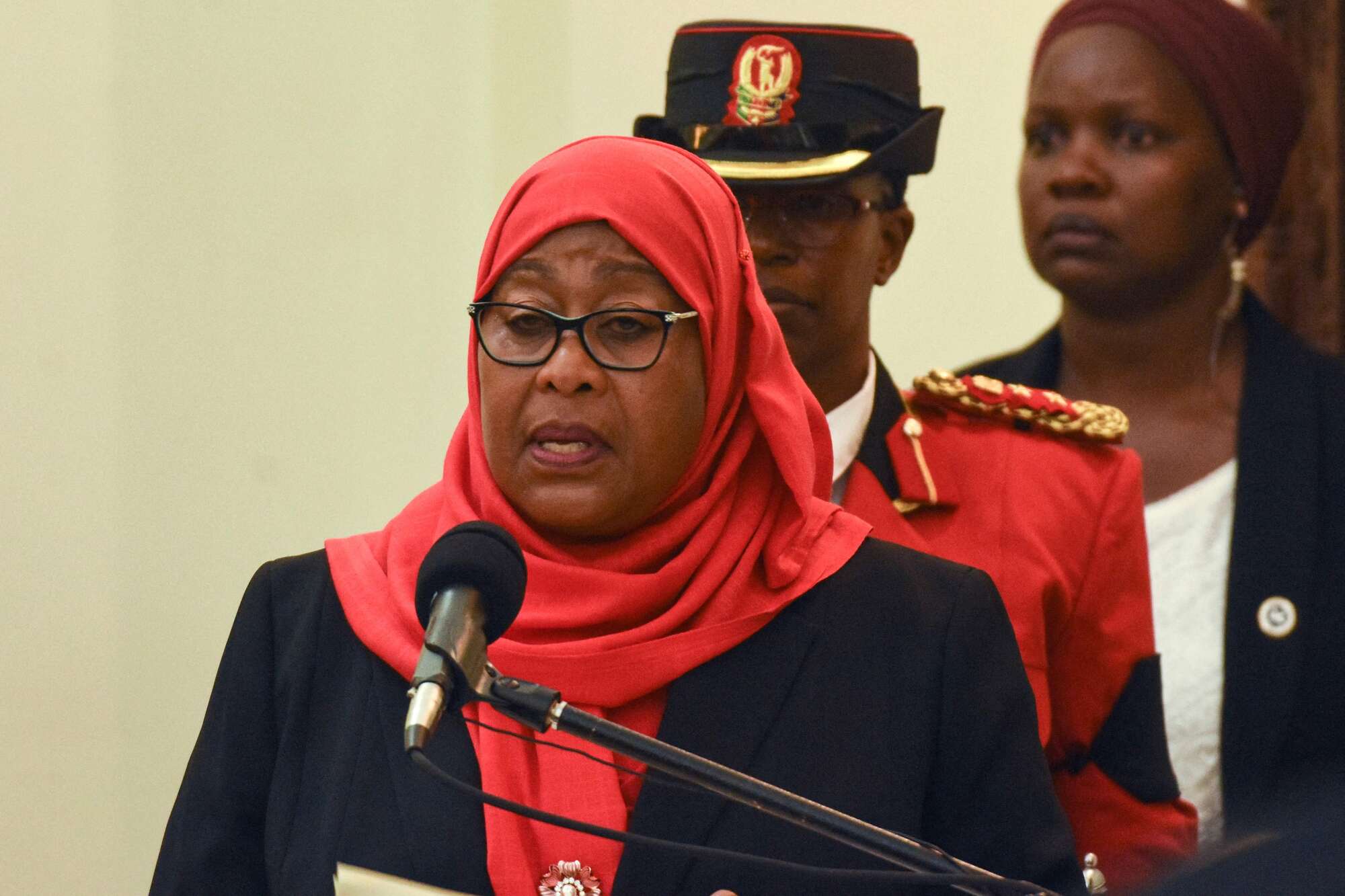Strictly Personal
Samia-Opposition détente is a yaw-yaw far better than war-war, By Jenerali Ulimwengu
Published
1 year agoon

Of the bold moves that have been undertaken in recent months to effect some détente in the political situation in Tanzania, this is probably the most daring. That the main opposition party would have the cheek to invite President Suluhu Hassan to officiate at its political rally, and that she would accept was, until it happened, unthinkable.
Now that it has happened it has raised a number of questions without answers, simply because of its novelty, given our recent history in all matters political. What is the game plan? people are asking. Who is pulling a fast one on whom? Who is the card and who is the dunce? What is the strategic aim of all this, and what is each party expecting as the outcome of the game?
All we mortals know is that the chairman of Chadema — probably the biggest opposition party in the country —announced out of the blue that he had invited President Samia, who is also chair of the ruling party CCM, to be the guest of honour at a Chadema symposium on March 8, commemorating International Women’s Day.
That was clearly unprecedented, and when it was confirmed that Samia had indeed accepted the invite, it was clear that we had moved away from the times when these two political formations were mortal enemies. The very thought that they would open the doors to each other’s activities was mutually anathema. At least that is how casual observers viewed the political chasm between these organisations.
Political culture
It has been the political culture in the country that opposition political parties have been registered but not openly allowed to operate, only being tolerated as an unnecessary evil that has been foisted on the country by circumstances “beyond our control.” The ruling party has had that stance all the time since former Chief Justice Francis Nyalali produced a report that was adopted by all the structures of the political system, leading to multiparty politics.
The multiparty system limped, huffed and panted under successive regimes headed by Ali Hassan Mwinyi, Benjamin Mkapa and Jakaya Kikwete, all of them presidents who paid lip service to the new dispensation but did everything to kill it. They were all too hypocritical to say openly what they wanted.
With the arrival of John Pombe Magufuli at the helm, and after being made chair of CCM, a new order was born —one of zero tolerance to opposition. His stance was clear for all to see: The opposition had to be killed, and he did his damnedest to make that a reality. By 2020, he had achieved that, only he died.
Undoing the system
Samia, as Magufuli’s successor, has had other ideas, and she has been meticulously undoing the system that the dead president had crafted, which wanted the single-party rule reinstated and his personal rule extended forever.
That is why he did not allow his own party cadres, who could have won without vote stealing; he replaced them with candidates who had polled far fewer votes in the preliminaries, and then stole the ballots at a strategic level, where his security operatives replaced the returning officers, election observers and even voters, wholesale.
We started hearing people saying they were going to “force him” to change the constitution to “allow him” to rule without end when, in fact, it was he who was making himself president for life. His henchmen/women were busy with all manner of stratagems, including killing or disappearing people who he wanted dead, stashing away slush funds for his project, and preparing a compliant base of sycophants who would never challenge him.
In those circumstances, when Magufuli died, Samia found herself with no real support from her own party, and the first steps she took included bringing together all elements of goodwill, notwithstanding political affiliation.
Help the country move on
It is not too crazy to think Samia and Freeman could have come to understand that the political conditions of the country require them to come closer together with a view to helping the country to move forward.
March 8 comes across as the ideal moment to break the ice, because the advancement of women’s issues is something there can be little disagreement over. For that reason, I think the choice of the occasion and the date was superb.
That did not stop tongues wagging on both sides of the spectrum. On the opposition side, it might appear that Chadema is selling out, while on the side of CCM, Mama is too eager to appease the very people who want her job and CCM’s comfort zone just to please their sworn “enemies.”
During the meeting, it was refreshing to hear the two main protagonists exchanging good-natured barbs in political conversations, emphasising competition without enmity. Freeman did not miss the opportunity to reiterate his party’s basic demands on political reforms, and Samia stressing the importance of the collaboration shown by the two parties to become a norm, because, she said, there were people who did not want conversations such as this one to take place.
This ice-breaking mode serves as a safety valve that will allow the nation to breathe, and should be encouraged. As they say, yaw-yaw is better than war-war.
You may like
-


Tanzania, Rwanda others recall Johnson & Johnson children’s cough syrup
-


Diamond Platnumz stuns fans by preaching with Bible during show
-


Tanzania’s apex bank raises interest rate to check ‘lingering inflationary pressures’
-


Tanzanian singer Zuchu in cloud nine as hit single ‘Sukari’ makes YouTube history in East Africa
-


Tanzanian singer Zuchu apologises for ‘sexually inappropriate’ show
-


Partners ‘willing to walk away,’ US warns Tanzania over gas project delays
Strictly Personal
Air Peace, capitalism and national interest, By Dakuku Peterside
Published
4 days agoon
April 16, 2024
Nigerian corporate influence and that of the West continue to collide. The rationale is straightforward: whereas corporate activity in Europe and America is part of their larger local and foreign policy engagement, privately owned enterprises in Nigeria or commercial interests are not part of Nigeria’s foreign policy ecosystem, neither is there a strong culture of government support for privately owned enterprises’ expansion locally and internationally.
The relationship between Nigerian businesses and foreign policy is important to the national interest. When backing domestic Nigerian companies to compete on a worldwide scale, the government should see it as a lever to drive foreign policy, and national strategic interest, promote trade, enhance national security considerations, and minimize distortion in the domestic market as the foreign airlines were doing, boost GDP, create employment opportunities, and optimize corporate returns for the firms.
Admitted nations do not always interfere directly in their companies’ business and commercial dealings, and there are always exceptions. I can cite two areas of exception: military sales by companies because of their strategic implications and are, therefore, part of foreign and diplomatic policy and processes. The second is where the products or routes of a company have implications for foreign policy. Air Peace falls into the second category in the Lagos – London route.
Two events demonstrate an emerging trend that, if not checked, will disincentivize Nigerian firms from competing in the global marketplace. There are other notable examples, but I am using these two examples because they are very recent and ongoing, and they are typological representations of the need for Nigerian government backing and support for local companies that are playing in a very competitive international market dominated by big foreign companies whose governments are using all forms of foreign policies and diplomacy to support and sustain.
The first is Air Peace. It is the only Nigerian-owned aviation company playing globally and checkmating the dominance of foreign airlines. The most recent advance is the commencement of flights on the Lagos – London route. In Nigeria, foreign airlines are well-established and accustomed to a lack of rivalry, yet a free-market economy depends on the existence of competition. Nigeria has significantly larger airline profits per passenger than other comparable African nations. Insufficient competition has resulted in high ticket costs and poor service quality. It is precisely this jinx that Air Peace is attempting to break.
On March 30, 2024, Air Peace reciprocated the lopsided Bilateral Air Service Agreement, BASA, between Nigeria and the United Kingdom when the local airline began direct flight operations from Lagos to Gatwick Airport in London. This elicited several reactions from foreign airlines backed by their various sovereigns because of their strategic interest. A critical response is the commencement of a price war. Before the Air Peace entry, the price of international flight tickets on the Lagos-London route had soared to as much as N3.5 million for the economy ticket. However, after Air Peace introduced a return economy class ticket priced at N1.2 million, foreign carriers like British Airways, Virgin Atlantic, and Qatar Airways reduced their fares significantly to remain competitive.
In a price war, there is little the government can do. In an open-market competitive situation such as this, our government must not act in a manner that suggests it is antagonistic to foreign players and competitors. There must be an appearance of a level playing field. However, government owes Air Peace protection against foreign competitors backed by their home governments. This is in the overall interest of the Nigerian consumer of goods and services. Competition history in the airspace works where the Consumer Protection Authority in the host country is active. This is almost absent in Nigeria and it is a reason why foreign airlines have been arbitrary in pricing their tickets. Nigerian consumers are often at the mercy of these foreign firms who lack any vista of patriotism and are more inclined to protect the national interest of their governments and countries.
It would not be too much to expect Nigerian companies playing globally to benefit from the protection of the Nigerian government to limit influence peddling by foreign-owned companies. The success of Air Peace should enable a more competitive and sustainable market, allowing domestic players to grow their network and propel Nigeria to the forefront of international aviation.
The second is Proforce, a Nigerian-owned military hardware manufacturing firm active in Rwanda, Chad, Mali, Ghana, Niger, Burkina Faso, and South Sudan. Despite the growing capacity of Proforce in military hardware manufacturing, Nigeria entered two lopsided arrangements with two UAE firms to supply military equipment worth billions of dollars , respectively. Both deals are backed by the UAE government but executed by UAE firms.
These deals on a more extensive web are not unconnected with UAE’s national strategic interest. In pursuit of its strategic national interest, India is pushing Indian firms to supply military equipment to Nigeria. The Nigerian defence equipment market has seen weaker indigenous competitors driven out due to the combination of local manufacturers’ lack of competitive capacity and government patronage of Asian, European, and US firms in the defence equipment manufacturing sector. This is a misnomer and needs to be corrected.
Not only should our government be the primary customer of this firm if its products meet international standards, but it should also support and protect it from the harsh competitive realities of a challenging but strategic market directly linked to our national military procurement ecosystem. The ability to produce military hardware locally is significant to our defence strategy.
This firm and similar companies playing in this strategic defence area must be considered strategic and have a considerable place in Nigeria’s foreign policy calculations. Protecting Nigeria’s interests is the primary reason for our engagement in global diplomacy. The government must deliberately balance national interest with capacity and competence in military hardware purchases. It will not be too much to ask these foreign firms to partner with local companies so we can embed the technology transfer advantages.
Our government must create an environment that enables our local companies to compete globally and ply their trades in various countries. It should be part of the government’s overall economic, strategic growth agenda to identify areas or sectors in which Nigerian companies have a competitive advantage, especially in the sub-region and across Africa and support the companies in these sectors to advance and grow to dominate in the African region with a view to competing globally. Government support in the form of incentives such as competitive grants ,tax credit for consumers ,low-interest capital, patronage, G2G business, operational support, and diplomatic lobbying, amongst others, will alter the competitive landscape. Governments and key government agencies in the west retain the services of lobbying firms in pursuit of its strategic interest.
Nigerian firms’ competitiveness on a global scale can only be enhanced by the support of the Nigerian government. Foreign policy interests should be a key driver of Nigerian trade agreements. How does the Nigerian government support private companies to grow and compete globally? Is it intentionally mapping out growth areas and creating opportunities for Nigerian firms to maximize their potential? Is the government at the domestic level removing bottlenecks and impediments to private company growth, allowing a level playing field for these companies to compete with international companies?
Why is the government patronising foreign firms against local firms if their products are of similar value? Why are Nigerian consumers left to the hands of international companies in some sectors without the government actively supporting the growth of local firms to compete in those sectors? These questions merit honest answers. Nigerian national interest must be the driving factor for our foreign policies, which must cover the private sector, just as is the case with most developed countries. The new global capitalism is not a product of accident or chance; the government has choreographed and shaped it by using foreign policies to support and protect local firms competing globally. Nigeria must learn to do the same to build a strong economy with more jobs.
Strictly Personal
This is chaos, not governance, and we must stop it, By Tee Ngugi
Published
1 week agoon
April 10, 2024
The following are stories that have dominated mainstream media in recent times. Fake fertiliser and attempts by powerful politicians to kill the story. A nation of bribes, government ministries and corporations where the vice is so routine that it has the semblance of policy. Irregular spending of billions in Nairobi County.
Billions are spent in all countries on domestic and foreign travel. Grabbing of land belonging to state corporations, was a scam reminiscent of the Kanu era when even public toilets would be grabbed. Crisis in the health and education sectors.
Tribalism in hiring for state jobs. Return of construction in riparian lands and natural waterways. Relocation of major businesses because of high cost of power and heavy taxation. A tax regime that is so punitive, it squeezes life out of small businesses. Etc, ad nauseam.
To be fair, these stories of thievery, mismanagement, negligence, incompetence and greed have been present in all administrations since independence.
However, instead of the cynically-named “mama mboga” government reversing this gradual slide towards state failure, it is fuelling it.
Alternately, it’s campaigning for 2027 or gallivanting all over the world, evoking the legend of Emperor Nero playing the violin as Rome burned.
A government is run based on strict adherence to policies and laws. It appoints the most competent personnel, irrespective of tribe, to run efficient departments which have clear-cut goals.
It aligns education to its national vision. Its strategies to achieve food security should be driven by the best brains and guided by innovative policies. It enacts policies that attract investment and incentivize building of businesses. It treats any kind of thievery or negligence as sabotage.
Government is not a political party. Government officials should have nothing to do with political party matters. They should be so engaged in their government duties that they literally would not have time for party issues. Government jobs should not be used to reward girlfriends and cronies.
Government is exhausting work undertaken because of a passion to transform lives, not for the trappings of power. Government is not endless campaigning to win the next election. To his credit, Mwai Kibaki left party matters alone until he had to run for re-election.
We have corrupted the meaning of government. We have parliamentarians beholden to their tribes, not to ideas.
We have incompetent and corrupt judges. We have a civil service where you bribe to be served. Police take bribes to allow death traps on our roads. We have urban planners who plan nothing except how to line their pockets. We have regulatory agencies that regulate nothing, including the intake of their fat stomachs.
We have advisers who advise on which tenders should go to whom. There is no central organising ethos at the heart of government. There is no sense of national purpose. We have flurries of national activities, policies, legislation, appointments which don’t lead to meaningful growth. We just run on the same spot.
Tee Ngugi is a Nairobi-based political commentator
EDITOR’S PICK


Africa’s largest tech hub AfriLabs welcomes 16 new additions
The largest network technology hub in Africa, AfriLabs, has announced the admission of 16 new hubs into its fold, thereby...


Wife of Zambian music star Yo Maps sues businessman over alleged cyberbullying
The wife of Zambian music sensation, Elton Mulenga, popularly known as Yo Maps, Kidist Kifle, has sued a Lusaka-based businessman...


IMF gives reasons why it advised Nigeria to remove fuel subsidy
The International Monetary Fund (IMF) has given reasons why it advised Nigeria to end the fuel subsidy regime which it...


Nigerian Chess master Tunde Onakoya sets 58-hour new chess-a-thon record, pushes for 60 hours
Nigerian chess master, Tunde Onakoya, on Saturday, achieved his dream of setting a new Guinness World Record for the longest...


Survey ranks Egypt, Ethiopia, Morocco, South Africa among 15 ‘cheap countries’ for family trips
A recent survey carried out by Insider Monkey, an investment website that tracks corporate insiders and hedge funds, has ranked...


Nigerians drum support for chess master Tunde Onakoya as he attempts to break world record
Nigerians from all walks of life, including politicians, captains of industry and celebrities, have drummed up support for chess master,...


SA internet service provider Kaya Konekta launches data access for underserved communities
South Africa’s leading Internet Service Provider (ISP), Kaya Konekta (KaKo), has launched new operations aimed at reaching underserved communities in...


Zambian opposition party decries rise in tribalism, corruption, calls for national dialogue
One of Zambia’s main opposition party, the Socialist Party (SP), has decried what it calls the rising tribalism, repression and...


‘Reconsider your anti-people policies, they are causing hardship, insecurity in Nigeria’— PDP tells Tinubu
Nigeria’s main opposition party, the Peoples Democratic Party (PDP), has called on President Bola Tinubu to consider what it calls...


Top European, Asian clubs on alert as Super Eagles keeper set to make contract decision
Some top clubs in Europe and Asia have been put on alert as Super Eagles and Chippa United goalkeeper, Stanley...
Trending
-

 Tech2 days ago
Tech2 days agoNigeria’s MAX partners Ghana’s Kofa in e-bike financing deal
-

 Sports2 days ago
Sports2 days agoTop European, Asian clubs on alert as Super Eagles keeper set to make contract decision
-

 Metro1 day ago
Metro1 day ago‘Reconsider your anti-people policies, they are causing hardship, insecurity in Nigeria’— PDP tells Tinubu
-

 Metro2 days ago
Metro2 days agoZambia asks EU to help strengthen its democratic initiatives ahead of 2026 elections


